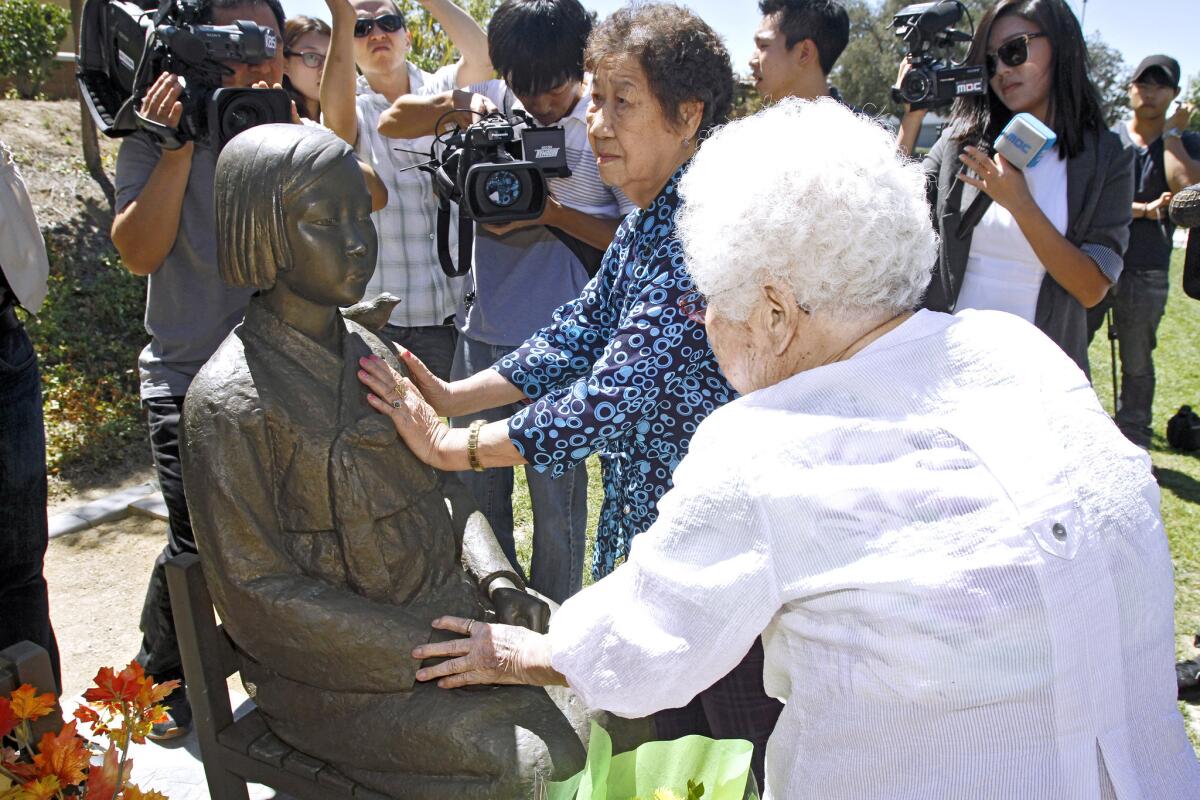Former ‘comfort women’ visit statue

Two former sex slaves of the Japanese Imperial Army during World War II, commonly known as “comfort women,” visited a Glendale statue that honors their struggles on Thursday to commemorate the upcoming third anniversary of the city’s “Comfort Women Day” on July 30.
“I am here to say personally, help us to find our dignity and our honor back,” Ok-Seon Lee, 87, said through a translator, as she patted the bronze statue with one hand and held her cane in the other.
PHOTOS: Former ‘comfort women’ visit statue
The 1,100-pound bronze monument depicting a young woman in Korean attire sitting on a chair whipped up controversy around the world when Glendale erected it last year.
Conservative Japanese lawmakers who deny the army’s involvement in the sex-slave system — despite recognition from international historians and a 2007 resolution passed by the House of Representatives — called on the City Council to remove the statue. A Japanese American woman who lives in Glendale also sued the city in an attempt to get it thrown out of Central Park.
The lawsuit is making its way through the federal court system and, earlier this week, the two comfort women visited a downtown Los Angeles courthouse to file declarations in support of the city of Glendale in the case.
According to the lawsuit, Glendale infringed upon the federal government’s power to conduct foreign affairs by installing the statue.
Between 80,000 to 200,000 women from Korea, China and other countries were forced into prostitution against their will, according to historical estimates.
A former Japanese prime minister had personally apologized to former sex slaves in the 1990s, but survivors say that’s not enough. They want an official resolution from the Japanese parliament, known as the Diet, that apologizes for their plight and offers government-funded restitution.
Lee was 15 when she was abducted in 1942 by two men in their 40s while working as a maid for an innkeeper in a Chinese village, according to her court declaration. She was raped by Japanese soldiers at an air base in China and then forced to work at a military brothel.
“At that moment, all I could think of was wanting to die,” Lee said in court documents.
When she was 16, she escaped the brothel, where she had sex with 10 to 25 soldiers a day, but she didn’t know where to go. She ran to a mountainside, but was quickly found and severely beaten, permanently damaging her vision and hearing.
After contracting syphilis, a sexually-transmitted disease, a military doctor treated her with mercury and she became infertile.
Il-Chul Kang, 85, has a similar story. At 14, she was abducted by a Japanese soldier and policeman from her family’s home in the Korean countryside and sent to a Japanese military base in China in 1944, according to court documents. She was raped by soldiers at the air base. They punched her in the head and broke her arm when she resisted.
After Kang contracted Typhoid fever, soldiers planned to kill her and burn her on a bed of firewood in the mountainside with another sick girl. As the soldiers searched for firewood, a group of mountain villagers saved the girls, court records show.
“I lived in shame all my life as a comfort woman,” she said in court documents. “There are nights I wake up to find my pillows soaked in tears.”
After visiting the Glendale statue, Kang and Lee, who both reside in an assisted-living center for former sex slaves in Seoul, were pushed in wheelchairs through an art exhibit highlighting their pasts at the nearby Glendale Central Library. Amid cartoons and paintings of young girls crying and screaming, the women said they were grateful that American citizens were sharing their stories.
“If we keep silent, there will be no apology, no resolution,” Lee said through a translator. “I have to speak up. That’s why I’m here.”
The Korea-Glendale Sister City Assn. has planned several free activities to commemorate Comfort Women Day:
—Exhibition featuring 42 art pieces, Glendale Central Library, 222 E. Harvard St., through Aug. 2. Hours are 10 a.m. to 8 p.m., Monday to Thursday, 10 a.m. to 6 p.m. Friday and Saturday and 1 to 5 p.m., Sunday.
—Performances by dancers, singers and actors, at 7 p.m. Sunday at the Alex Theatre, 216 N. Brand Blvd.
—Dance and drawing performances from 11 a.m. to 4 p.m. Monday at Central Park, 201 E. Colorado St., with samples of bibimbap, a Korean dish, served around noon.
—Seoul Metropolitan Theater Company presents a play about comfort women at 7:30 p.m. Tuesday at the Alex Theatre, 216 N. Brand Blvd.